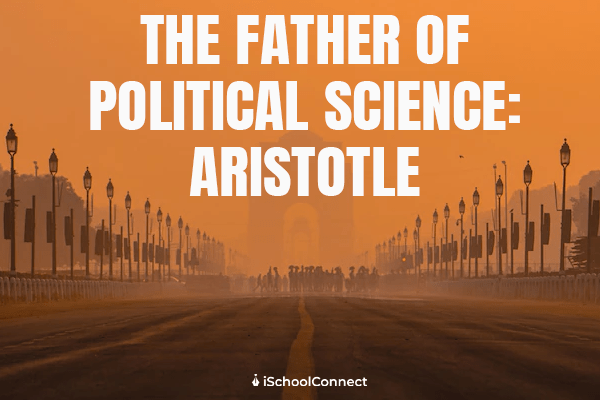Table of Contents
Introduction
The father of political science, Aristotle, was a Greek philosopher and scientist. He was born in Stagira in 384 BC and died in 322 BC at the age of 63 years. His works on philosophy and the sciences have influenced many centuries and cultures. As one of the most prolific writers in history, he wrote about everything from politics to physics. In Book III of Politics (350 BCE), he wrote about what we would now call ‘political institutions’ or ‘political systems.’
Aristotle’s ‘Politics’ is often hailed as a cornerstone of political theory. In this work, he deliberates on the idea of citizenship and the different forms of government. His perspectives on democracy, tyranny, and ideal governance have stood the test of time, provoking discourse and influencing political thought across generations. Notably, his classification of governments into monarchy, oligarchy, and democracy was a pioneering effort that laid the groundwork for modern political systems’ analysis. Today, political science is one of the most desired degrees of the social sciences abroad, countries such as New Zealand and more.
Continue reading this blog to know more about political science and the father of political science.
What is Political Science?
Political science or politicology is the academic study of politics. It involves comprehending groups, classes, a government, diplomacy, a law, a strategy, and a war in addition to political ideas, ideologies, institutions, policies, processes, and behavior. Political science students acquire research, communication, and data analysis skills widely applicable in the public and private sectors.
It is a social science investigating the concepts and methods of politics and government. Political scientists examine public policies, leadership styles, and international relations. They also look at how political institutions function in different countries.
Political science is distinct from political philosophy in that it focuses on the practical aspects of governance rather than the question of what constitutes a just society: ‘What should be?’ In contrast to their colleagues who study law or economics, political scientists are interested in understanding how power works—how it’s used or abused by those with access to it.
Overview of the Philosophy of Aristotle, the Father of Political Science
Aristotle received instructions from Plato on the Isle of Lesbos. His political nonfiction book, The Politics, is just one example of the wide range of his output. It also includes writings on other topics, including poetry, logic, rhetoric, biology, zoology, metaphysics, ethics, and more.
Aristotle’s Life: The Father of Political Science

Aristotle was born in Stagira, which is now either in Greece or Macedonia. His father served as a physician for Macedonia’s royal court. His mother would have received philosophical education as a woman of high birth. He spent nine years studying with Plato, but he also studied with luminaries like Anaxagoras, Xenocrates, and Crantor.
As with many other sciences, modern political science has evolved significantly from its early roots in the time of Aristotle and Plato. The primary intent of political science as a discipline was to bring scientific rigor to the study of politics. Aristotle was one of the earliest thinkers who considered political science. His approach differed considerably from that of Plato in that he focused on empirical observations rather than pure philosophical reasoning.
Aristotle also made important contributions to political, social, and economic philosophy. The philosophical work Ethics by Aristotle is said to be his most influential work. One of the first to categorize political systems was him. Aristotle classified governments into a monarchy, oligarchy, and democracy. He divided law into three categories as well: natural law, human law, and divine law. In the end, he distinguished four different economic systems: the household economy, the slave economy, the petty retail trade economy, and the factory production economy (manufacturing).
Views on Slavery, Democracy, and Tyranny
In his 1851 essay The Negro Race, he claimed that ‘unless the negroes’ civil and political rights are swiftly acknowledged, there would be no fair opportunity for them to mature into men. It is still too likely that our nation will experience suffering that could shake its foundations.
Aristotle thought the ancient republics of Athens and Rome served as the best examples of the ideal republic. But in both instances, the demos eventually rose against the aristocracy. The cause was their gradual gaining of excessive power, which led to them becoming arrogant and oppressive.
Views on Flat Earth theory
While many of Aristotle’s contemporaries thought the earth was flat, he disagreed. The Greek philosopher added that lunar eclipses occur when the earth passes through the sun and moon’s center. According to Aristotle, the earth’s shape is like a sphere or circle around its circumference. The shadow of the earth would look very different if it were flat. Aristotle then thought about where the North Star was. The star seemed to be heading north, approaching the sky.
However, if one traveled south of what is now considered the equator, one could not see the North Star. Aristotle finally observed the ship’s dock, and before he could see the entire ship, he could see the tops of their sails in the distance. According to Aristotle, the earth’s crescent-shaped shape was not the same as its actual shape. Aristotle’s conclusion would be accurate if we were on a flat planet.
Key takeaways
- Aristotle was a distinguished Greek philosopher. He was the first to offer a practical definition of political science. He regarded political science as a potent and active field of study.
- The extensive writings by Aristotle on the Ideal State, slavery, revolution, education, citizenship, forms of government, the Golden Mean Theory, the Theory of Constitution, and other topics have earned him the title of father of political science.
- He believed that understanding the subjects above is essential and that people must be conscious of their surroundings and the environment.
We hope you enjoyed reading this blog! If so, please share your views in the comments below. Click here to reach out to us for more information about pursuing a political science course abroad.
We would be happy to assist you with your queries.
Liked this blog? Read next: Economics | A detailed guide to the science of wealth and the world of econ
FAQs
Q1. What four subfields of political science are there?
Ans – The four main subfields of political science are American politics, comparative politics, international relations, and political theory.
Q2. Besides political science, what else made Aristotle famous?
Ans – Aristotle was the first genuine scientist in history and one of the greatest philosophers ever. He invented the field of formal logic, made groundbreaking contributions to all areas of philosophy and science, identified the various branches of science, and investigated the connections between them.
Q3. What was Aristotle’s most significant invention?
Ans – Aristotle invented the method of logical deduction, perhaps the key to all his notable accomplishments. He was the first to develop a simple and reasonable approach for concluding the available propositions.






